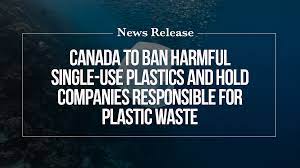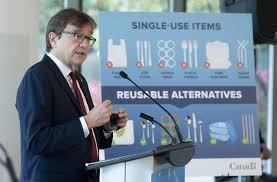From an Article by Michael Lee, Canadian Television News, December 9, 2022
Canada’s ban on single-use plastics, starting with the manufacture and import for sale of a number of products, comes into effect later this month on December 20, 2022.
The prohibition on several categories of plastics will begin Dec. 20, affecting a range of products from checkout bags and cutlery to takeout containers and stir sticks. A ban on the sale of these products will start in December 2023.
The move is part of an effort by the Canadian government to achieve zero plastic waste by 2030, citing the impact that plastics have had on the environment through pollution and greenhouse gas emissions.
Here are the products that will be subject to Canada’s single-use plastics ban starting Dec. 20:
CHECKOUT BAGS ~ Checkout bags made entirely or in part from plastic and used to carry purchased goods from a business will be subject to the Dec. 20 ban on manufacture and import for sale.
The ban also includes fabric bags that cannot meet a stress test, meaning they can’t break or tear if carrying 10 kilograms over a distance of 53 metres, 100 times, or when washed.
CUTLERY ~ The ban on cutlery includes single-use plastic knives, forks, spoons, sporks and chopsticks that contain either polystyrene or polyethylene, or that change their physical properties when run through a household dishwasher 100 times.
TAKEOUT CONTAINERS ~ The prohibition includes clamshell containers, lidded containers, boxes, cups, plates and bowls made entirely or in part from plastic and designed for serving or transporting ready-to-eat food or beverages.
These products will be subject to the ban if they contain: expanded or extruded polystyrene foam, the latter commonly referred to as Styrofoam; polyvinyl chloride, often used in salad containers; carbon black or black plastic food containers that usually come with a transparent lid; or oxo-degradable plastic.
STIR STICKS ~ All types of plastic stir sticks, designed to mix beverages or prevent them from spilling from a lid, will be banned under the federal government’s current regulations.
STRAWS ~ The prohibition will include straight plastic drinking straws and flexible straws that are packaged together with beverage containers, such as juice boxes and pouches. Straws that contain polystyrene or polyethylene, or which can’t be run through a dishwasher 100 times, are subject to the ban.
Single-use plastic flexible straws, not packaged with a beverage container, are excluded under certain conditions, such as to accommodate people with disabilities. A retail store, for example, may sell a package of 20 or more single-use plastic flexible straws if a customer asks and the package is not displayed publicly. Retailers may also sell beverage containers with a flexible plastic straw for another two years.
TIMELINE ~ The manufacture and import for sale in Canada of the five categories of single-use plastics comes into effect on Dec. 20.
A ban on the sale of these products will begin the following year by Dec. 20, 2023, while a prohibition on the manufacture, import and sale for export of these plastics will come into effect on Dec. 20, 2025.
A prohibition on the manufacture and import for sale in Canada of ring carriers or six-pack rings, used to carry aluminum cans and plastic bottles, will begin on June 20, 2023. Their sale will be banned by June 20, 2024, while their manufacture, import and sale for export will be prohibited starting Dec. 20, 2025.
>>>>>……………>>>>>……………>>>>>……………>>>>>

Climate Barometer newsletter: Sign up to keep your finger on the climate pulse


{ 2 comments… read them below or add one }
I have been forgetting to check this site, still used to having frackCheck appear in my inbox. I’m glad I thought to do it this morning, as this story is so cheering and I had not seen a thing about this ban!
INFORMATION BULLETIN ~ For Immediate Release
Dec. 21, 2022 Ministry of Energy, Mines and Low Carbon Innovation
Province hits pause on electrical connections for cryptocurrency mining
VICTORIA – To preserve British Columbia’s supply of clean electricity to support the Province’s climate action and economic goals, BC Hydro will suspend electricity-connection requests from cryptocurrency mining operations for 18 months.
The temporary suspension will preserve B.C.’s electricity supply, while giving government and BC Hydro sufficient time to engage with industry and First Nations, and develop a permanent framework for any future cryptocurrency mining operations.
“Cryptocurrency mining consumes massive amounts of electricity to run and cool banks of high-powered computers 24/7/365, while creating very few jobs in the local economy,” said Josie Osborne, Minister of Energy, Mines and Low Carbon Innovation. “We are suspending electricity connection requests from cryptocurrency mining operators to preserve our electricity supply for people who are switching to electric vehicles and heat pumps, and for businesses and industries that are undertaking electrification projects that reduce carbon emissions and generate jobs and economic opportunities.”
B.C.’s clean, affordable electricity has attracted unprecedented interest from cryptocurrency miners. Currently, 21 projects are requesting a total of 1,403 megawatts that will be temporarily suspended. That is equivalent to the energy needed to power approximately 570,000 homes, or 2.1 million electric vehicles, per year in B.C.
If these connections were to continue unchecked, much of BC Hydro’s available energy to use strategically in support of British Columbia’s CleanBC goals could be eroded by cryptocurrency mining projects, with little remaining to electrify projects that have greater jobs, economic development and greenhouse gas reduction benefits.
To preserve B.C.’s clean and affordable electricity, the Province has directed the B.C. Utilities Commission to accept an application from BC Hydro for temporary relief from its obligations to provide service to new cryptocurrency mining projects for 18 months while government develops a permanent framework.
New cryptocurrency mining projects may not initiate the process of connection with BC Hydro, and projects at early stages of the connection process will also be halted. Cryptocurrency mining projects that are operational, and a small number of projects that are well advanced in BC Hydro’s connection process, will not be affected. The connection of other types of projects that do not mine cryptocurrency will not be affected.
Quick Facts:
1. BC Hydro provides service to seven cryptocurrency mining operations, with six more in advanced stages of connection to the system, totalling 273 megawatts.
2. In November 2022, the Manitoba government suspended new connections to the electricity grid for cryptocurrency mining while it analyzed the potential for a regulatory framework for approving large connections to the grid.
3. After suspending cryptocurrency mining connection requests to study its effects on electricity supply, Hydro-Québec implemented a new framework for cryptocurrency service that includes higher rates and a cap on the amount of electricity available for cryptocurrency mining.
Learn More ~ To learn more about the potential implications of unchecked growth of cryptocurrency mining operations, read a new report from BC Hydro titled Crypto conundrum:
Why cryptocurrency mining could challenge B.C.’s clean transition:
https://www.bchydro.com/content/dam/BCHydro/customer-portal/documents/news-and-features/bchydro-crypto-energy-report.pdf
Contact: Ministry of Energy, Mines and Low Carbon Innovation
Media Relations